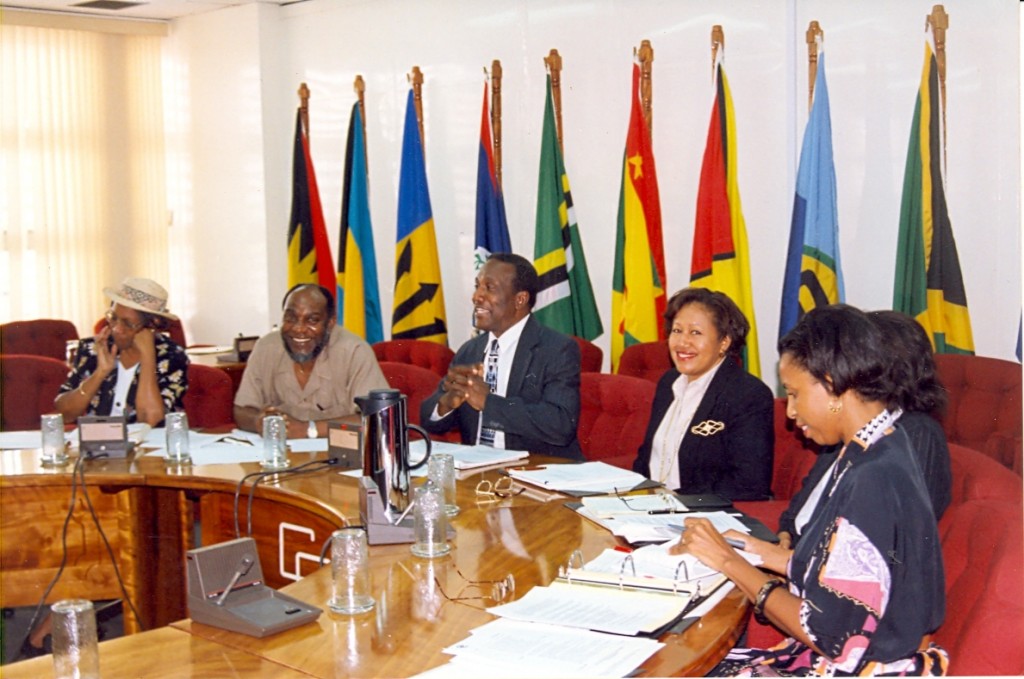Past Relationships:
DR. CARLA BARNETT – First Female Deputy Secretary-General
Dr. Carla Barnett, a national of Belize, holds the distinction of being the first female Deputy Secretary-General of CARICOM. She served the Community in that capacity from 1997 to 2002. While acknowledging the milestone that she achieved, she deflected attention to the skills set that she brought to the position.
”It was an honour for me to be selected. Being the first female Deputy Secretary-General, while it was a historical milestone, I’d like to think that I came there not because I was a woman, but because I brought a particular set of skills that the Secretariat needed at that time,” she said.
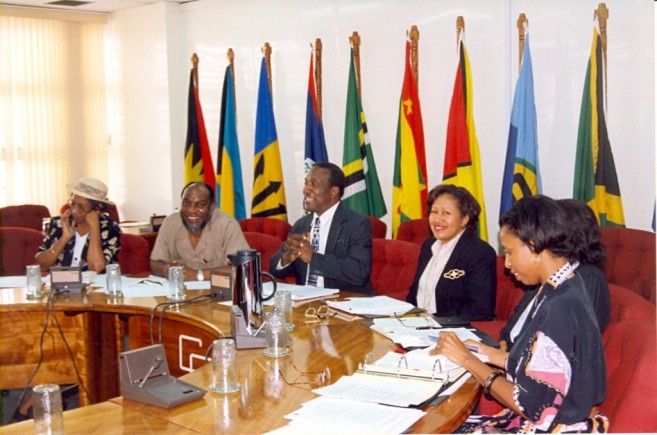
Dr. Barnett was educated at the University of the West Indies, Mona Campus in Jamaica where she read for a Ph.D. in Social Sciences. She also holds a Master of Economics degree from the University of Western Ontario in Canada, and a Bachelor of Science degree in Economics from the University of the West Indies, Mona Campus in Jamaica.
Dr. Barnett has extensive experience at the executive level of the public service in Belize and in the CARICOM region. Her work experience includes service as Financial Secretary and Deputy Governor/Acting Governor at the Central Bank of Belize. She has also served as a Vice President at the Caribbean Development Bank and is now a Senator in Belize’s Upper House.
Her tenure as CARICOM Deputy Secretary-General coincided with the re-organisation of the CARICOM Secretariat, the Community’s administrative body.
When she joined the staff of the Secretariat in early 1997, the Community was in the process of completing the negotiation of the Protocols revising the Treaty of Chaguaramas, and was putting in place new Community structures such as the Community Council and the Bureau of Heads of Government. At the time, “the Secretariat itself needed to re-organise the way it did business,” she recalled in a recent interview” and her immediate priority was to modernize certain key internal processes.
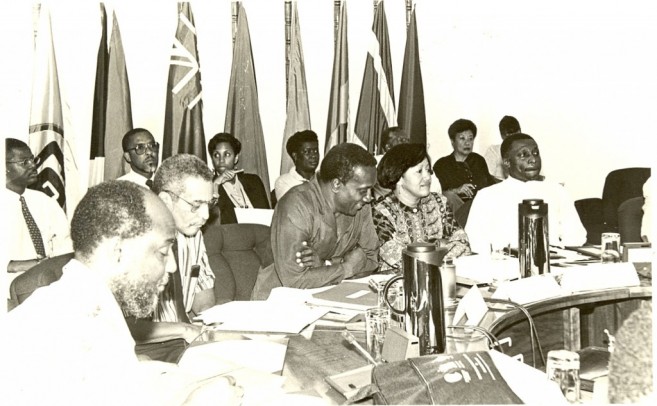
“One of the first projects that I pushed was the computerisation of the Secretariat. We had few computers, we didn’t have a computer network. We raised money … through CIDA which allocated resources to us and we built the first local area network/wide area network that connected every department in the Secretariat. We got about a hundred computers or more . That project helped the Secretariat communicate internally; we were able to do our work more quickly, efficiently and be more responsive to Member States.
“I took that on because in a world in which communication was so critical, and given the fact that our countries were spread across… we couldn’t depend on the old modes of doing things. Integration means we have to talk to one another quicker, be more responsive. So it was really important for us to do that project. I know the Secretariat has built on that… I see the website, good things are happening there. So that’s one of the critical things that my team and I did quite early in my term. And it touched staff personally in the way they did their work,” she recalled.
A lot of time was spent during her tenure on modernising the management of resources. Major emphasis was placed on updating financial rules, procurement systems, processes for developing projects, establishment of internal oversight, and accountability in general. The Secretariat, she recalled wanted to demonstrate that it was using its resources well, and the modernisation ensured that it engaged its donors and potential donors in a more structured way.
“I know that that approach to resource mobilisation continues to be developed and that there is a whole new dynamic which continues in terms of accessing and managing resources,” she said.
Dr. Barnett recalled the focus that also was placed on the establishment of the Pan Caribbean Partnership Against AIDS (PANCAP) which she categorised as critical.

“We supported that and generated the resources to get that done. That began within the Secretariat with people like Dr. Eddie Greene and the staff in the health portfolio and really grew into something that became globally known as a best practice on HIV and AIDS. That is one of the things that I think we did really well,” she said.
As the Community continues its integration journey, Dr. Barnett lauded the work that has been done so far but acknowledged that there was lot more to be done. In the area of Trade, for example, her vision is for Member States to cease limiting the dialogue to increasing trade with each other, and to expand the focus to utilising the single CARICOM economic space to target increased trade with the rest of the world.
She pointed to the development of human resources and the necessity for Member States to bring into effect measures, such as training and education “equivalencies that need to be sorted out so people can travel and work more freely in the Community”.
Since her tenure, two other females were appointed Deputy Secretary-General, Ambassador Lolita Applewhaite and current DSG, Ambassador Manorma Soeknandan, PhD.
Belizean honoured with Order of the Caribbean Community
PM George Price, OCC
PRIME MINISTER GEORGE PRICE
In 1992, CARICOM began to recognise the most sterling of contributors of individuals from all walks of life who helped shape our Community. The Order of the Caribbean Community (OCC) is the Regional honour conferred on distinguished CARICOM nationals who have made outstanding contributions to the development of the Community.
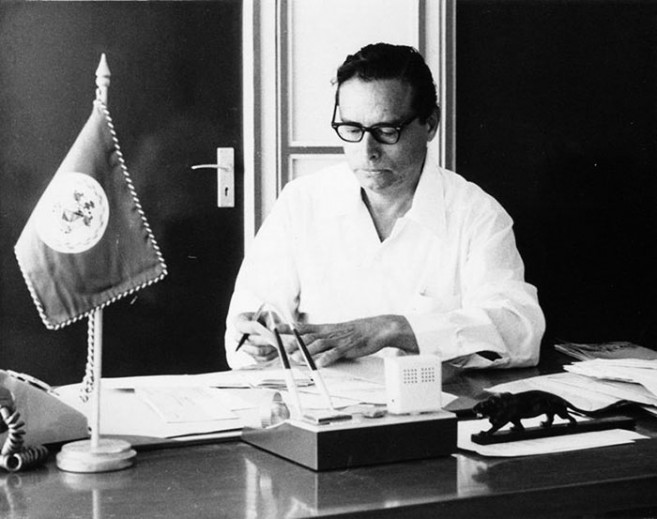
In 2001, the Community conferred the OCC on the Rt. Hon George Price, for Premier and first Prime Minister of Belize. Born in January 1919, in Belize City, Mr. Price served as a Member of the Legislative Council from 1954-1961, The Legislative Assembly from 1961 to 1964, The House of Representatives from 1964-1984, First Minister from 1961 to 1964, Premier from 1964 to 1981 and Prime Minister of Belize from 1981 to 1984, and 1989 to 1993.
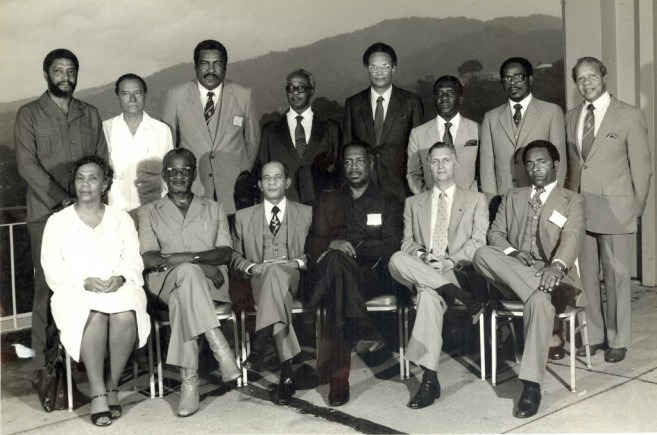
Mr. Price died in 2011.
Current Relationships:
Profile of the Chairman of the Conference of Heads of Government of CARICOM – the Hon Dean Barrow, Prime Minister of Belize
The Hon. Dean Barrow, Prime Minister of Belize, currently holds the Chairmanship of the Conference of Heads of Government of the Caribbean Community (CARICOM).
Prime Minister Barrow was born in Belize City on March 2, 1951. He was trained at the University of the West Indies, Cave Hill (LL.B. 1973); Norman Manley Law School, Mona (Certificate of Legal Education, 1975); University of Miami School of Law (L.M. 1981) and the University of Miami (M.A. International Relations).

He was first elected to the House of Representatives at the 1984 General Elections as the United Democratic Party candidate in the Queen’s Square electoral division. He served as the Minister of Foreign Affairs and Economic Development in the 1984-1989 UDP administration.
Mr. Barrow was re-elected to his Queen’s Square House seat in 1989 and 1993. In the 1993-1998 UDP term in government, he was appointed Deputy Prime Minister and Minister of Foreign Affairs and National Security, and Attorney General.
Following the UDP’s defeat at the 1998 election, Mr. Barrow, who had retained his seat in the House of Representatives, was elected Leader of the Opposition. As party leader, he was again re-elected as Area Representative for Queen’s Square at the 2003 General Election, and increased his party’s standing in the House of Representatives. On February 7, 2008, Mr. Barrow led the UDP to office in a landslide General Election victory. In Belize’s sixth post-independence election, the UDP won 25 of the 31 seats in the House of Representatives.
Mr. Barrow led his party to victory again in the 2015 General Elections.
Profile of the Secretary-General of CARICOM
Ambassador Irwin LaRocque, a national of Dominica, is the seventh Secretary-General of the Caribbean Community (CARICOM). Ambassador LaRocque is firmly committed to deepening integration within CARICOM and advancing cooperation within the wider Caribbean.
He is the former Assistant Secretary-General for Trade and Economic Integration at the CARICOM Secretariat, a position he assumed in September 2005. Prior to that, he served, with distinction, at senior management levels in the Public Service of Dominica for over eighteen (18) years.
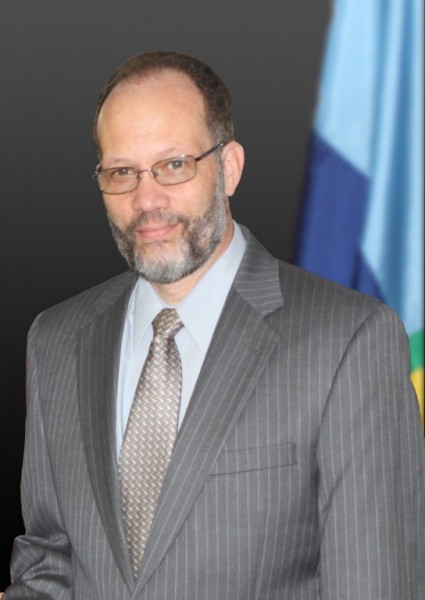
During his tenure in the Dominica public service, Ambassador LaRocque served in several capacities, including Principal Adviser to the Government of Dominica on all matters pertaining to Regional integration and international trade. He was Dominica’s Senior Policy Adviser on the revision of the original Treaty of Chaguaramas and served on the Inter-Governmental Task Force (IGTF) which resulted in the Revised Treaty of Chaguaramas.
He also served as Permanent Secretary in various Ministries for more than fourteen (14) years, including in the Ministries of Trade, Industry, Enterprise Development, Tourism, and Foreign Affairs, where he headed the diplomatic service. He also has private sector experience.
As Assistant Secretary-General, Ambassador LaRocque provided strategic leadership for the continuing implementation and further development of the CARICOM Single Market and Economy (CSME) including the Sectoral Programmes of the Community, such as agriculture, services, industry, energy and information and communications technology. He has been a firm believer that the CSME cannot succeed without the advancement of the social sector, such as human resource development and youth.
Ambassador LaRocque has managed diplomatic negotiations with third countries and international development partners. He has a wealth of experience in management, public administration, economic development, trade, foreign affairs and diplomacy.
Ambassador LaRocque was educated at Queen’s College, the New School for Social Research, and New York University where he majored in Political Philosophy, Political Economics and Economics. He is married and has children.

